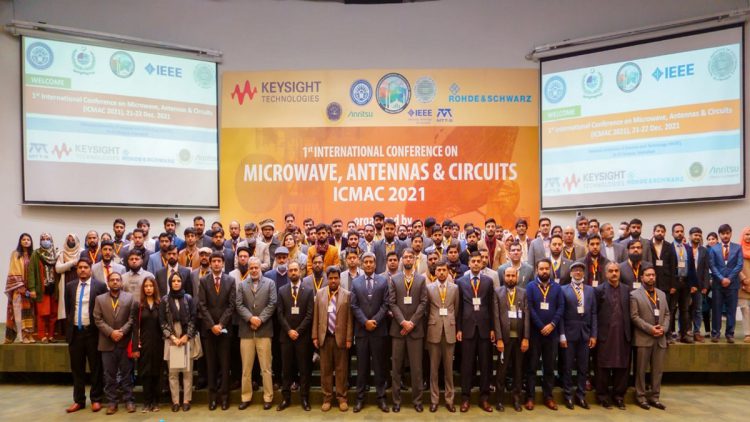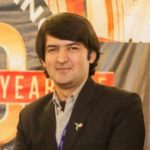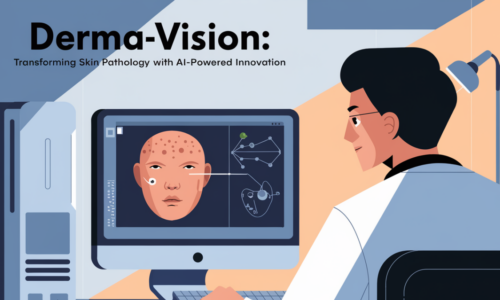The Research Institute for Microwave and Millimeter-Wave Studies (RIMMS) at National University of Sciences and Technology (NUST), Islamabad, Pakistan and National Institute of Electronics (NIE), Islamabad have organized the Pakistan’s first dedicated international conference on Microwave, Antennas & Circuits (ICMAC 2021) on 21-22 December 2021 at NUST H-12 Campus, Islamabad. The conference was the culmination of a vision that started four years ago with the establishment of the Pakistan’s first Institute of Electrical and Electronics Engineers (IEEE) Antennas and Propagation Society (APS) and Microwave Theory and Technology (MTT) society, Electromagnetic Compatibility (EMC) society and Circuits and Systems Society (CAS) joint technical chapter at NUST-RIMMS, Islamabad. While holding international workshops & seminars in 2017, 2018 & 2019, the chapter has organized more than hundred events and webinars by eminent local and international speakers since its inception. ICMAC, brings together this experience to organize, the first ever conference in Pakistan focused on three thematic areas of Antennas, Microwave and Circuits.
ICMAC 2021, with its hybrid-mode, provided a unique platform to bring together large number of local participants for face-to-face interaction as well as online participants from around the globe. The conference was absolutely free for the students and the IEEE members. The conference has received an encouraging response from local and international community. The key statistics of the conference are shown below:
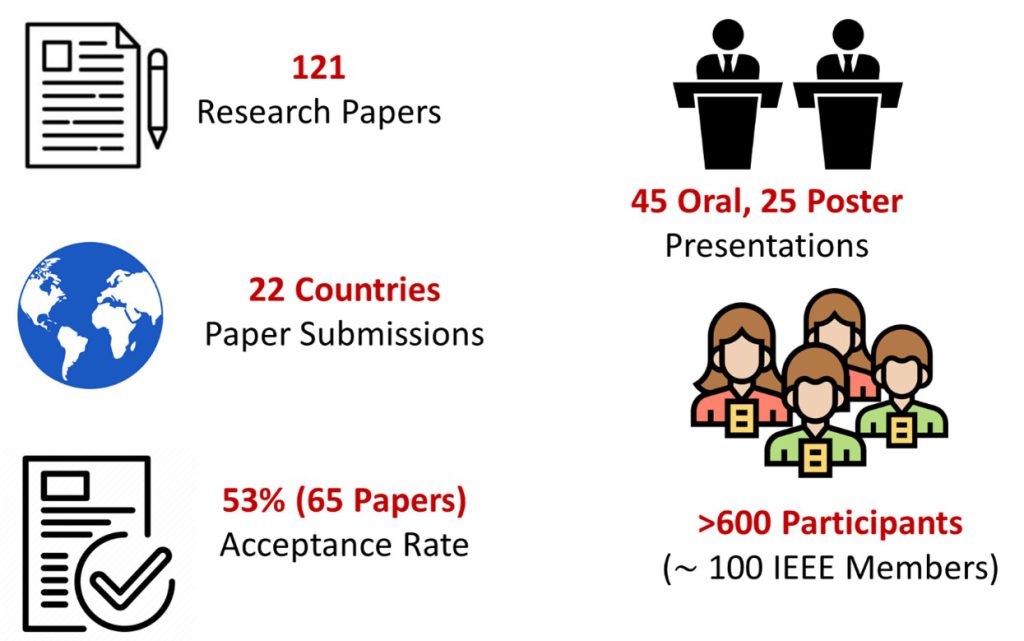
ICMAC 2021 featured five keynotes from world renowned professors including Prof. Ke Wu from University of Montreal, Canada, Prof. Behzad Razavi & Prof. Mona Jarrahi from University of California, USA, Prof. Tei Jun Cui from Southeast University, China and Prof. Atif Shamim from King Abdullah University of Science and Technology, Saudi Arabia. There were nine technical sessions on variety of research topics including antenna design & applications, microwave sensing & imaging, beam forming, Radar, metasurfaces and CMOS & GaN Integrated Circuits and RF amplifiers. In addition, there was an interactive poster session, three panel discussion sessions, an industrial talk and exhibition. Special sessions on women in microwave engineering and humanitarian activities being conducted under IEEE APS society were also be the part of the program. A Gala dinner, providing an excellent networking opportunity, was held at the end of first day of the conference. The conference also housed the industrial exhibit by the leading OEMs and private companies.
The day-01 started with the inaugural speeches by Conference Chair, Dr. Nosherwan Shoaib, and the Pro-Rector Research, Innovation & Commercialisation – NUST, Dr. Rizwan Riaz. Dr. Shoaib welcomed the participants and highlighted the key features of conference technical program. Dr. Riaz emphasized the importance of such conferences for the betterment of the community. Afterwards, Dr. Atif Shamim from King Abdullah University of Science and Technology (KAUST), Saudi Arabia delivered the inaugural technical talk on “Microwave Water-Cut Sensors for Oil Industry: From Design to Field Deployment”. He presented the key design challenges for development of water-cut sensors based on RF & microwave and their importance for the oil industry.
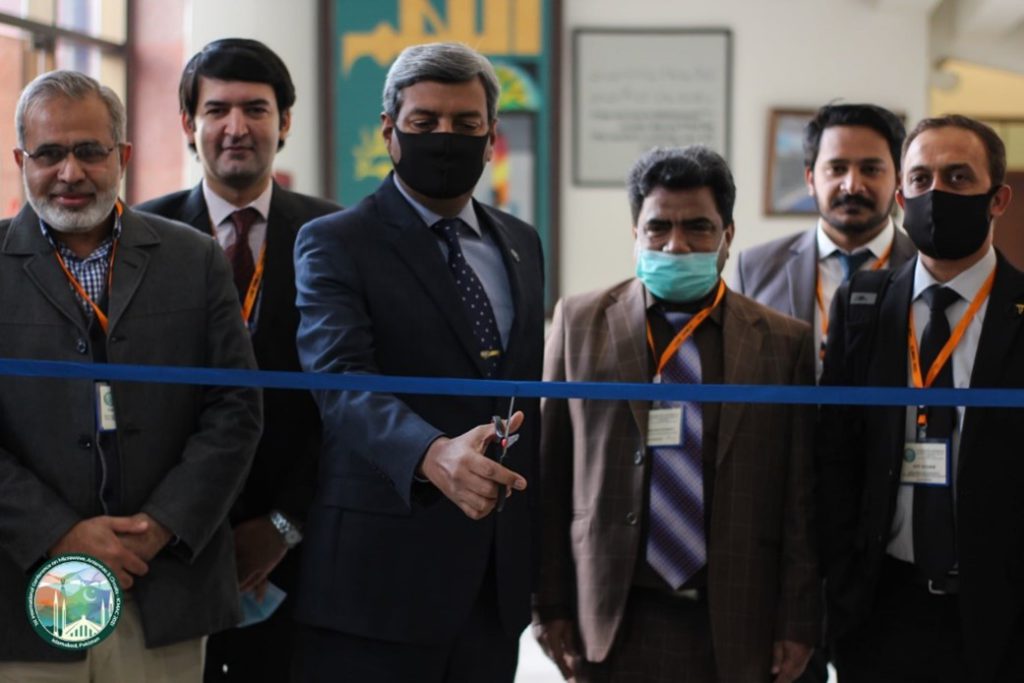
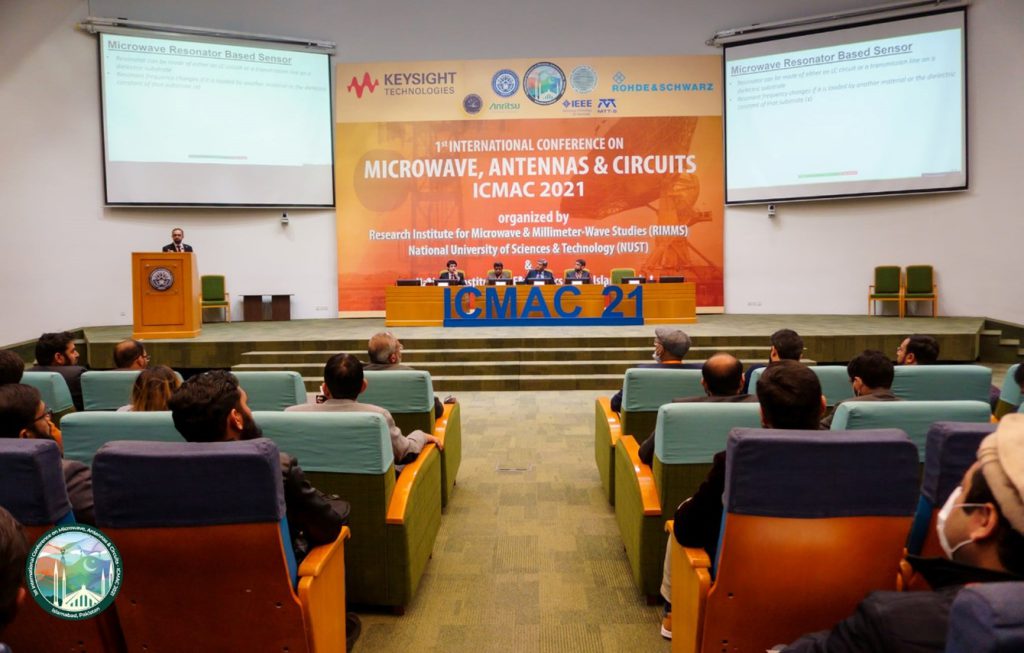
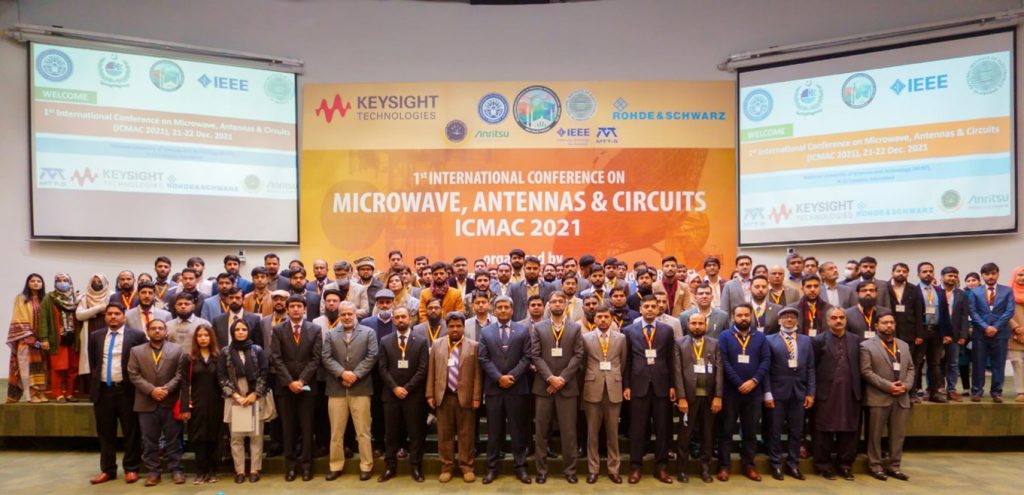
After the inaugural session, two keynotes talks were delivered. The first keynote talk was delivered by Professor Mona Jarrahi from the University of California Los Angeles USA. The talk title was “New Frontiers in Terahertz Technology”. She shared her research activities in the Terahertz domain and highlighted the new advancements in the Terahertz technology. Professor Ke Wu from the University of Montreal Canada delivered the second keynote talk on battery-less Internet of Things (IoT) sensors in which he has discussed the far-field wireless power transfer and harmonic backscattering techniques to power IoT devices.
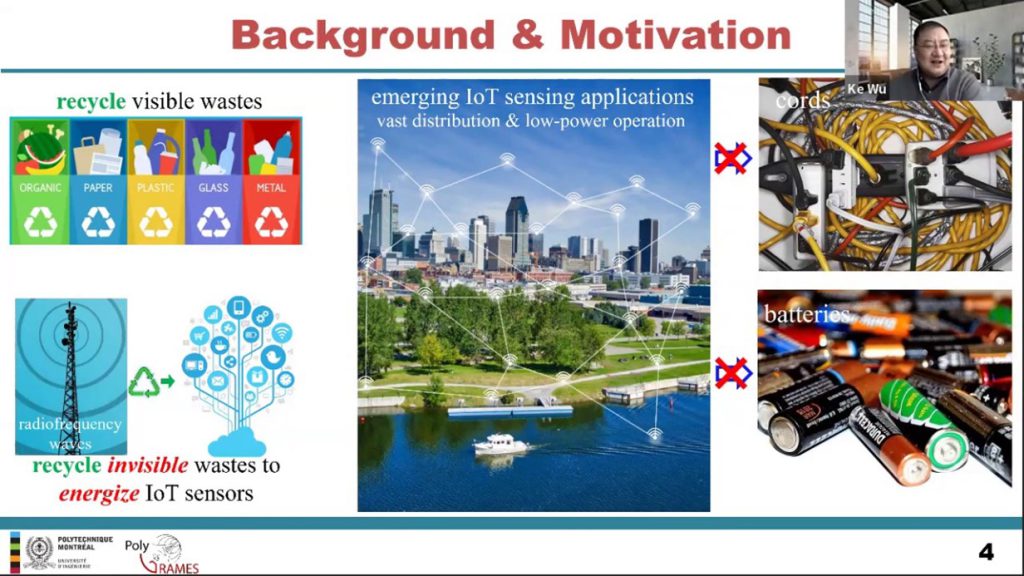
Six technical sessions were held on day-01 which were based on variety of research topics including antenna design & applications, microwave sensing & imaging, beam forming, Radar, metasurfaces and CMOS & GaN Integrated Circuits. Afterwards, a dedicated panel session on humanitarian activities was held which was organized by IEEE APS SIGHT/COPE committee. The panellists included Prof. Yahia Antar (President, IEEE Antennas and Propagation Society) from RMC Canada, Dr. Lwanga Herbert, IEEE SIGHT Chair, USA, Dr. Ajay Poddar, Synergy Microwave Inc., USA, Chair, IEEE-AP-S Chapter Activities Committee, Dr. Jawad Siddiqui, University of Alberta, Canada, Chair, IEEE-AP-S SIGHT Committee and Ms. Camila Rodrigues, Brazil. The panellists highlighted the success stories of IEEE APS/COPE activities for the betterment of the community. In addition, different funding opportunities were shared with the participants in order to maximize the humanitarian activities for the sustainable development of the underserved community. The gala dinner, providing an excellent networking opportunity, concluded the day-01 the conference.
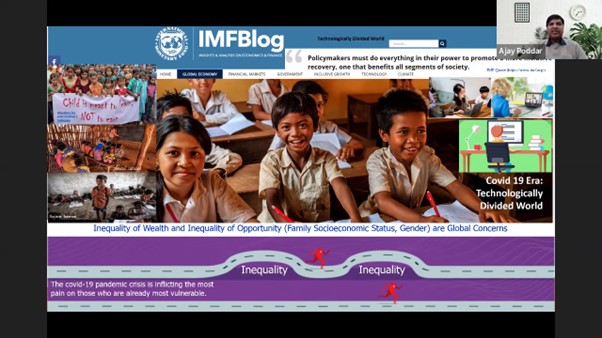
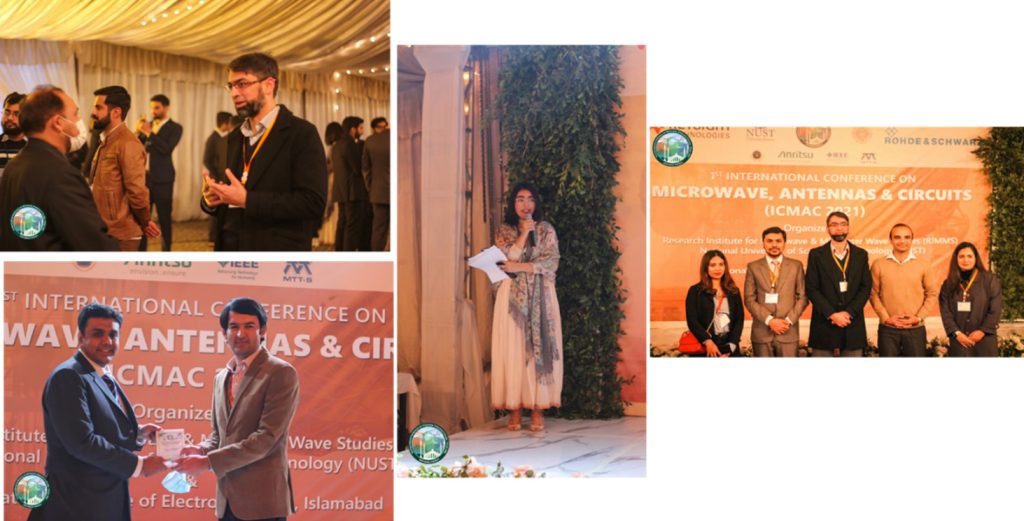
The day-02 started with two keynote talks by Professor Behzad Razavi, University of California, Los- Angeles, USA and Professor Tei Jun Cui, Southeast University, Nanjing, China. Prof. Razavi presented the past & the future prospects of the microelectronics, while Prof. Cui delivered the talk on new-architecture information systems based on information metamaterials.
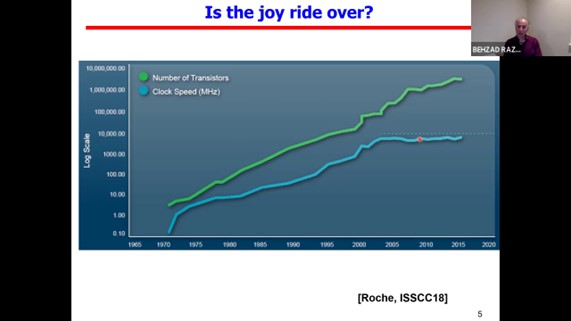
The day-02 also featured a panel discussion on “Challenges and opportunities in Radio Frequency (RF) and Integrated Circuit (IC) Design in Pakistan”. The panel was moderated by Dr. Hammad M. Cheema from NUST-RIMMS, while the panellists include Dr. Rashid Ramzan, FAST-NU, Pakistan, Dr. M. Faeyz Karim, NTU, Singapore, Dr. Sajid Baloch, NECOP, Pakistan, Dr. Atif Shamim, KAUST, KSA, Mr. Tahir Abbas, Bcube Pvt. Ltd and Mr. Ammar Ahmad Khan, Nexus Telecom Pvt. Ltd. The panellists highlighted the importance of RF & IC design research domain and provided the recommendations to ensure sustainable ecosystem for RF & IC design R&D in Pakistan.
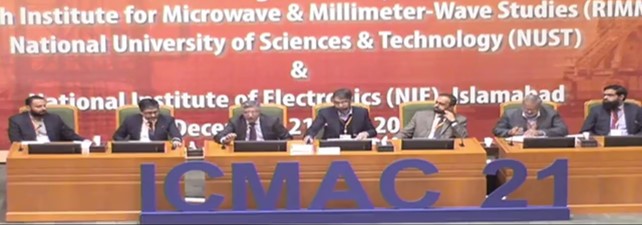
Three technical sessions were held on day-02 in which authors have presented research papers on 5G antennas, metasurfaces and microwave devices & amplifiers.
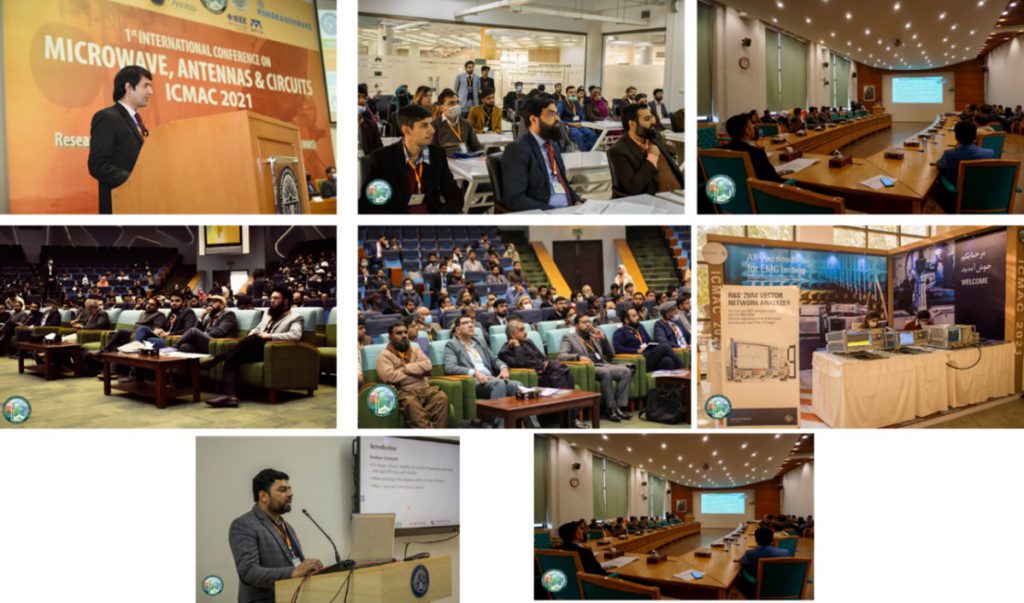
A panel discussion on “Challenges and Opportunities for Women in Microwave Engineering and role of young professionals for the betterment of the community” was also conducted in which female professionals from four different countries shared their experiences. The panellists include Sherry Hess, IEEE MTT-S AdCom 2020-22, MGA Women in Microwave (WiM) Chair, USA, Dominique Schreurs, Chair Strategic Planning Committee, Standing Committees, Member WiM, Belgium, Sara Barros, Operational Committee, Young Professionals Chair – MTT-S, USA, Ines Inacio Young Professional, MTT-S YP team member, the Netherlands, Ms. Aqeela Saghir, Links Foundation, Italy. The panellists highlighted the role & importance of women in microwave engineering and encourage young women to join this domain. A healthy Q/A session was held at the end of the session in which young female students asked interesting questions from the panellists.
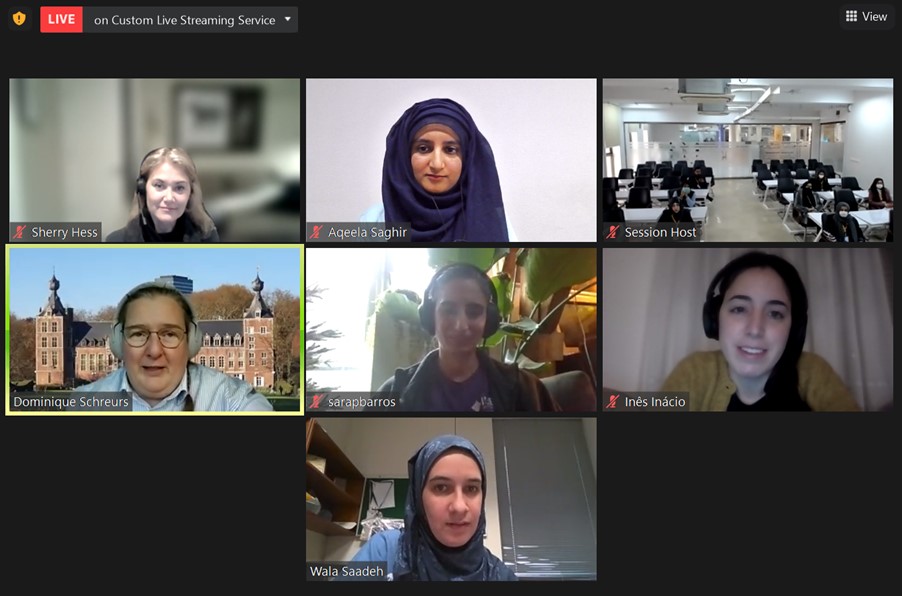
The closing ceremony was followed by the poster session at the end of day-02. The closing ceremony was graced by the President of Islamic Republic of Pakistan, His Excellency Dr. Arif Alvi. He appreciated the efforts of NUST in taking a lead role in specialized areas of Chip Design and Radio-Frequency Technologies. He asserted that the unprecedented growth in global markets of cellular phones, IoT, Electronics and Industry 4.0 necessitates the need of developing trained human resources that could contribute to meeting the domestic requirements of the country. Citing the US-China trade war revolving around semiconductors, the president emphasized the need to develop the end-to-end eco-system for ensuring the nation’s digital sovereignty and attaining a share in the burgeoning 500 Billion USD semiconductor market. He commended the efforts of NUST-RIMMS for their strenuous efforts in arranging the conference and bringing together world-renowned professors, academicians, and researchers on a single platform. Rector NUST, Engr Javed Mahmood Bukhari, in his address, highlighted the importance of conferences as an avenue for academic and scientific discourse. Furthermore, he added that such platforms are essential for bridging the gap between industry-academia collaborations. He mentioned that NUST has always focused on specialized scientific fields that provide indigenous solutions for local technology requirements and save foreign exchequer. He also shared the efforts underway to promote chip design R&D at NUST, including the introduction of focused academic programs, research on digital and analog ICs and the plans for a fabless chip design centre at NUST premises. The conference general chair & Principal RIMMS, Dr Hammad M. Cheema, emphasized the need for a national-level policy discourse to set the direction of the chip design eco-system in Pakistan. Being the first-ever conference to be held on these specialized topics in Pakistan, he lauded the excellent participation of over 600 students, researchers and industry representatives from the public and private sector. The conference proceedings were published on IEEE Xplore and can be accessed via following link: https://ieeexplore.ieee.org/xpl/conhome/9678193/proceeding.
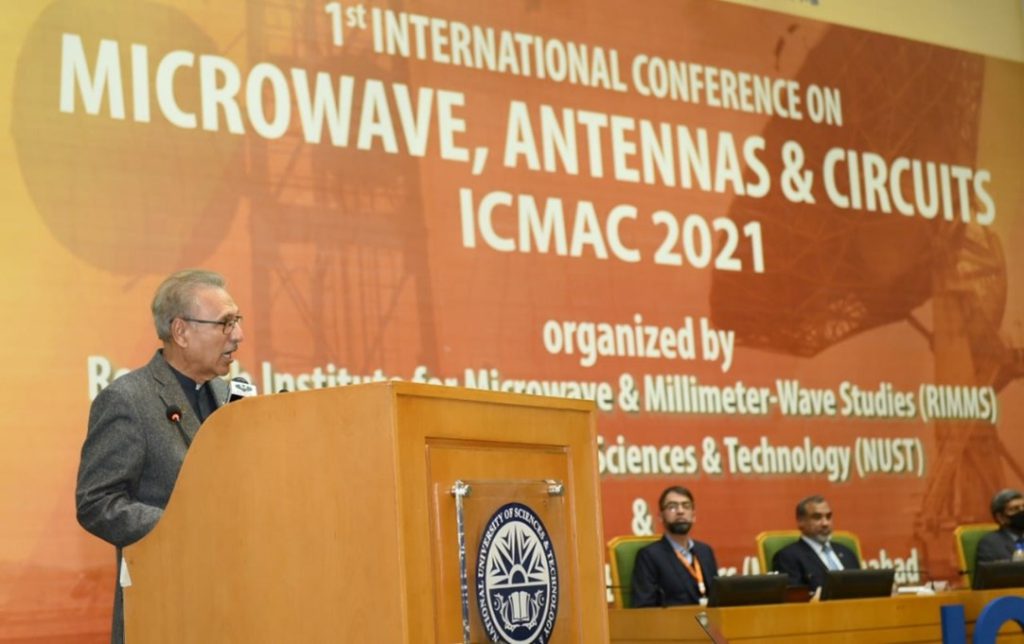
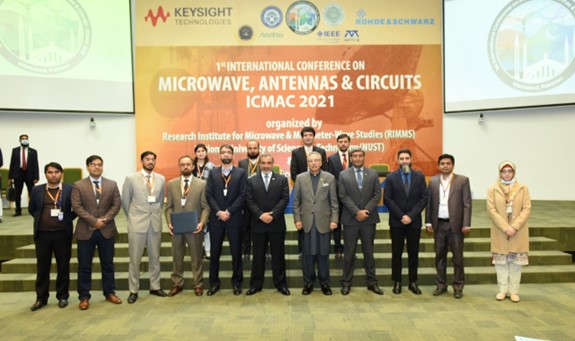
In conclusion, we would like to pay gratitude to all the national & international members of the technical program committee (TPC) and the international advisors for their guidance and support. We also thank and appreciate all the students, researchers and academicians who submitted their research work to the inaugural ICMAC 2021 and giving it a true flavour of a high-quality international conference. Stay tuned for the next edition of the ICMAC which will be held in 2023 in the vibrant & lively city of Pakistan i.e., Lahore. Hope to see you all there.
Acknowledgment:
The conference organizers would like to thank the financial sponsors including Keysight Technologies as Platinum sponsor, Rohde & Schwarz as Gold sponsor and National Radio Telecommunication Corporation (NRTC) & Anritsu as Silver sponsors for their generous support. Thanks to the MTT society for the conference technical co-sponsorship.
The author has served as the Conference Chair and currently serving as an Associate Professor at NUST School of Electrical Engineering and Computer Science (NUST-SEECS) and can be reached at nosherwan.shoaib@seecs.edu.pk.

